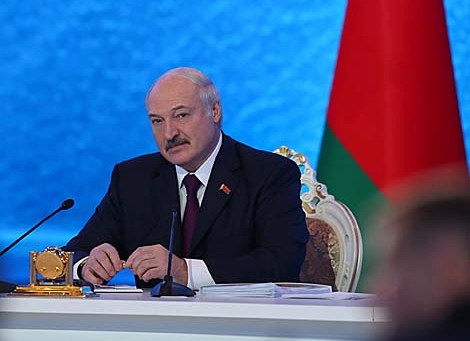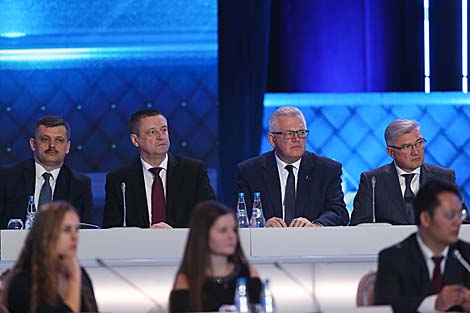Events
Plans to revise Belarus’ information security concept

MINSK, 1 March (BelTA) – The national information security concept will be revised at a session of the Security Council. Belarus President Alexander Lukashenko made the statement as he met with representatives of the general public and expert community, Belarusian and foreign mass media on 1 March, BelTA has learned.
The head of state noted that an information war is in progress in the world. “We don’t want it to evolve into a hot war or to be a harbinger of dangerous clashes,” Alexander Lukashenko said.
The president stressed that Belarus should know how to confront this war using various methods. “We are going to improve the information security concept. We can see the problem and are dealing with it already. We are going to revise and toughen the concept so that you could understand in what direction the authorities will work, particularly in the run-up to the presidential and parliamentary elections,” Alexander Lukashenko said.
Alexander Lukashenko said he believes that it is necessary to first of all get united inside the country in order to resist information assaults from the West or the East. Opposition has to be constructive. “Russia doesn’t want to lose Belarus, to orchestrate a coup here, to worsen the situation. I am convinced in it,” he said. “We have to bear all factors in mind. It is possible there is a problem from the East but there is an even greater problem from the West. Russians haven’t deployed missiles to the west of Moscow in order to target Belarus. Why does Poland, other countries [have to do it]? I am not going to recount them. Let’s be objective in this regard,” the Belarusian leader said.
 On the whole, the head of state noted that ordinary Russians treat Belarusians well. “Why do we have to throw stones at them? It is understandable that we may feel economic pressure in some aspects. There may be some concern about the tax maneuver. We will survive,” the president said. “In November we will finish upgrading our refineries and will buy oil on the market. The crude oil upgrading index will be 92-95%, as high as that of European oil refineries. Who will benefit from it? We will just bring someone else’s oil to the Russian market.”
On the whole, the head of state noted that ordinary Russians treat Belarusians well. “Why do we have to throw stones at them? It is understandable that we may feel economic pressure in some aspects. There may be some concern about the tax maneuver. We will survive,” the president said. “In November we will finish upgrading our refineries and will buy oil on the market. The crude oil upgrading index will be 92-95%, as high as that of European oil refineries. Who will benefit from it? We will just bring someone else’s oil to the Russian market.”
Information security in Belarus should not be built at the expense of others and by means of assaulting others, Alexander Lukashenko is convinced.
Speaking about sovereignty and independence, Alexander Lukashenko responded to criticism saying he had borrowed a slogan from Belarusian opposition. “The difference is that they [the opposition] were shouting a lot about it and tried to storm the gates. Ukraine has demonstrated what the approach can produce. I was doing it calmly, in a measured manner just like Belarusians should. I felt that 10 million Belarusians and 5 million guests, who travelled via Belarus, were behind my back,” noted the head of state.
“We’ve created this state together. Should I wreck it with my own hands? We are all committed – and I am above all – to our sovereignty and independence. We only use different fight methods. I don’t want a war, confusion or disorder,” Alexander Lukashenko stressed. “Those, who will try to destabilize the situation hoping to benefit from it, will feel the ‘flame of destabilization’ first,” Alexander Lukashenko warned.
He remarked that a lot of programs concerning Ukrainian affairs are being created in Russia. “The effect is reverse. It has to stop. It shouldn’t be done. The same is true for Belarus: we should talk less and do more. They tell me BelTA has received 2,000 questions within 24 hours [as part of the Your Question to the President initiative]. Take a look at what people want. Let’s solve those problems,” Alexander Lukashenko stressed.
The head of state also talked about Belarusian as the language of instruction in schools and universities. “An MP raised the matter [of establishing a special university where Belarusian will be used as the language of instruction]. I gave instructions to take a better look at the possibility. As far as I can understand, the conclusion is not favorable. We have a sufficient amount of universities where Belarusian language is taught and where Belarusian is spoken as the language of instruction,” he said.







 print version
print version make home page
make home page add to bookmarks
add to bookmarks

